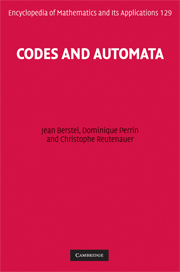Book contents
- Frontmatter
- Contents
- Preface
- 1 Preliminaries
- 2 Codes
- 3 Prefix codes
- 4 Automata
- 5 Deciphering delay
- 6 Bifix codes
- 7 Circular codes
- 8 Factorizations of free monoids
- 9 Unambiguous monoids of relations
- 10 Synchronization
- 11 Groups of codes
- 12 Factorizations of cyclic groups
- 13 Densities
- 14 Polynomials of finite codes
- Solutions of exercises
- Appendix: Research problems
- References
- Index of notation
- Index
3 - Prefix codes
Published online by Cambridge University Press: 05 March 2013
- Frontmatter
- Contents
- Preface
- 1 Preliminaries
- 2 Codes
- 3 Prefix codes
- 4 Automata
- 5 Deciphering delay
- 6 Bifix codes
- 7 Circular codes
- 8 Factorizations of free monoids
- 9 Unambiguous monoids of relations
- 10 Synchronization
- 11 Groups of codes
- 12 Factorizations of cyclic groups
- 13 Densities
- 14 Polynomials of finite codes
- Solutions of exercises
- Appendix: Research problems
- References
- Index of notation
- Index
Summary
Undoubtedly the prefix codes are the easiest to construct. The verification that a given set of words is a prefix code is straightforward. However, most of the interesting problems on codes can be raised for prefix codes. In this sense, these codes form a family of models of codes: frequently, it is easier to gain intuition about prefix codes rather than general codes. However, we can observe that the reasoning behind prefix codes is often valid in the general case.
For this reason we now present a chapter on prefix codes. In the first section, we comment on their definition and give some elementary properties. We also show how to draw the picture of a prefix code as a tree (the literal representation of prefix codes).
In Section 3.2, a construction of the automata associated to prefix codes is given. These automata are deterministic, and we will see in Chapter 9 how to extend their construction to general codes.
The third section deals with maximal prefix codes. Characterizations in terms of completeness are given. Section 3.4 presents the usual operations on prefix codes. Most of them have an easy interpretation as operations on trees.
An important family of prefix codes is introduced in Section 3.5. They have many combinatorial properties which illustrate the notions presented previously. The synchronization of prefix codes is defined in Section 3.6. In fact, this notion will be generalized to arbitrary codes in Chapter 9 where the relationship with groups will be established.
- Type
- Chapter
- Information
- Codes and Automata , pp. 107 - 176Publisher: Cambridge University PressPrint publication year: 2009

